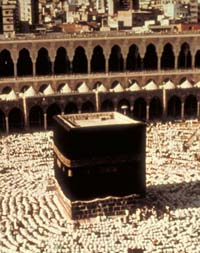Islam origins
 |
 |
 |
Muslims pray, encircling the Ka’ba in Makkah, during the Hajj annual pilgrimage |
The Prophet Muhammad was born in Makkah, in present-day Saudi Arabia, in 570 and grew up as a trader. At the age of 40 he had a visitation from the Angel Jibreel (Gabriel), who gave him messages from God. He told these messages to the people of Makkah, and some believed him and began to follow the teachings of God as revealed to Muhammad. He and his followers were forced to leave Makkah and travel to Medina, where they founded the first Muslim community in the year 622. The Muslim calendar dates from this journey, known as the Hijrah. After a few years Muhammad returned to Makkah with an army of supporters and re-entered the city. He died in 632.
The Qur’an
Muhammad continued receiving messages from God throughout the later part of his life. He memorised these messages and passed them on to his followers. After his death they were collected and written down in the Qur’an (Koran). The sayings and deeds of Muhammad were recorded in the Hadith. These two books are the source of guidance for all Muslims.
The Spread of Islam
Within the Prophet’s lifetime Islam covered most of the Arabian peninsular. In the following 100 years, Muslims conquered the Persian Empire and much of the Byzantine Empire to rule from North Africa and Spain to the borders of China. Many of the conquered peoples converted to Islam, although in some cases this took several centuries.
Now there are more than 50 independent Muslim countries and there is a worldwide population of around 1,300 million Muslims.
|

